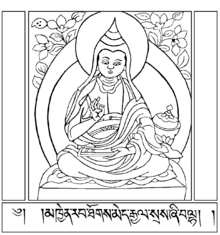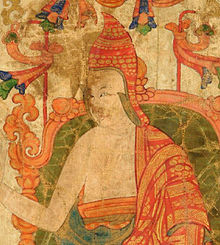Shantideva
Śāntideva | |
|---|---|
 Tibetan depiction of Shantideva | |
| Personal | |
| Born | c. 685 CE |
| Died | c. 763 CE |
| Religion | Buddhism |
| School | |
| Education | |
Shantideva (Sanskrit: Śāntideva; Chinese: 寂天; Tibetan: ཞི་བ་ལྷ།, THL: Zhiwa Lha; Mongolian: Шантидэва гэгээн; Vietnamese: Tịch Thiên) was an 8th-century CE Indian philosopher, Buddhist monk, poet, and scholar at the mahavihara of Nalanda. He was an adherent of the Mādhyamaka philosophy of Nāgārjuna. Abhayadatta Sri also lists Shantideva as one of the eighty-four mahasiddhas and is known as Bhusuku Pa (布苏固巴).[1]
Two works of Shantideva are extant, the Bodhisattvacaryāvatāra and the Śikṣāsamuccaya, both of which were written with the intention of being training manuals for one who intends to follow the path of the bodhisattva. The Bodhisattvacaryāvatāra in particular was the subject of both Indian and Tibetan commentaries during the period it was written and has also received large amounts of attention from both academics and lay practitioners in recent years as well including a commentary written by the 14th Dalai Lama.[2]
Biography
[edit]
There are two sources of Shantideva's life composed by the Tibetan historians; Buton Rinchen Drub and Taranatha. Recent scholarship has also brought to light a short Sanskrit life of Shantideva in a 14th-century Nepalese manuscript.[3]
According to one source, Shantideva was born in the Saurastra region (in modern-day Gujarat), son of a King Kalyanavarman, and went by the name Śantivarman.[4] But Vibhūticandra's Bodhicaryāvatāratātparyapañjikā Viśeṣadyotanī, the earliest extant biography of Shantideva, details that he was born in Southern India, in the city of Sringara, and his father was a King Mañjuśrīvarman.[5] As per Vibhūticandra, Shantideva ran away from home on the advice of his mother and travelled to Bengal and then Magadha. He served in the court of a Magadhan king and after leaving, arrived in Nalanda. During his stay in Nalanda, he was given the nickname, Bhūsuku due to his practice of Samadhi.[5]
According to Pema Chödrön, "Shantideva was not well-liked at Nalanda" due to his idleness.[6]
Apparently he was one of those people who didn't show up for anything, never studying or coming to practice sessions. His fellow monks said that his three "realizations" were eating, sleeping, and shitting.[6]
According to legend, Shantideva was goaded by his fellow monks into giving a talk to the entire university body while sitting on a large lion throne with the hope that on being exposed as unable to recite any scriptures, he would leave the monastery on his own accord. Shantideva easily climbed the throne and recited stanza 9.35 of The Way of the Bodhisattva.[6] The legend continues that at this point, the bodhisattva Manjushri appeared and then suddenly disappeared together with Shantideva. Following this event, when the monks investigated his cells, they discovered his three works, the Sūtrasamuccaya, the Śikṣāsamuccaya, and the completed Bodhicaryāvatāra.[5]
Conversionary activities in Magadha
[edit]Bu Ston details several tales from Shantideva's life which detail how he converted 500 Magadhans to Buddhism. It is said that Shantideva lived alongside the non-Buddhists while they were experiencing a natural disaster which led to them suffering from starvation. As he was appointed the head of these people, Shantideva demonstrated his supernatural abilities as he managed to make a single bowl of rice suffice for all of the 500. Similar stories are found in other sources detailing how Santideva would feed hundreds of beggars.[5]
Works
[edit]Śikṣāsamuccaya
[edit]The Śikṣāsamuccaya ("Training Anthology") is a prowith work in 19 chapters. It is organized as a commentary on 27 short mnemonic verses known as the Śikṣāsamuccaya Kārikā. It consists primarily of quotations (of varying length) from sūtras, authoritative texts considered to be the word of the Buddha—generally those sūtras associated with Mahāyāna tradition, including the Samadhiraja Sutra.[7]
Bodhicaryavatara
[edit]Shantideva is particularly renowned as the author of the Bodhisattvacaryāvatāra. A variety of English translations exist, sometimes glossed as "A Guide to the Bodhisattva's Way of Life" or "Entering the Path of Enlightenment."[8] It is a long poem describing the process of enlightenment from the first thought to full buddhahood and is still studied by Mahayana and Vajrayana Buddhists today.
An introduction to and commentary on the Bodhisattvacaryāvatāra by the 14th Dalai Lama called A Flash of Lightning in the Dark of Night was printed in 1994. A commentary on the Patience chapter was provided by the Dalai Lama in Healing Anger (1997), and his commentaries on the Wisdom chapter are in Practicing Wisdom (2004). Kunzang Palden has written a commentary based on that given by Patrul Rinpoche, translated by the Padmakara Translation Group. Patrul was a wandering monk of great scholarship who dedicated his life to propagating the Bodhisattvacaryāvatāra.[9]
Philosophical views
[edit]Personal identity and free will
[edit]Following the Buddha, Śāntideva believed that our innate investment in an inherent, personal, self or essence is not only groundless but toxic. Goodman suggests that Śāntideva also touches on the problem of free will in the Bodhicaryāvatāra, writing that "whatever transgressions (aparādha) and vile actions (pāpa) there are, all arise through the power of conditioning factors, while there is nothing that arises independently."[10]
Ethical views
[edit]In line with his views on personal identity and the nature of the self, Śāntideva wrote that one ought to "stop all the present and future pain and suffering of all sentient beings, and to bring about all present and future pleasure and happiness", in what may have been "the very earliest clearly articulated statement of that view, preceding Jeremy Bentham by approximately a thousand years".[10]
His basis for preferring altruism over egoism is that "the continuum of consciousness, like a queue, and the combination of constituents, like an army, are not real. The person who experiences suffering does not exist." Similarly, he asks, "when happiness is dear to me and others equally, what is so special about me that I strive after happiness only for myself?"[10]
Bodhicitta
[edit]The Bodhisattva is the central focus for both of the texts attributed to Shantideva. Bodhicitta is the mind that is focused on attaining the status of bodhisattva. The early chapters of the Bodhisattvacaryāvatāra are focused on praising the virtuous qualities of bodhicitta and also on how to strengthen and maintain it.[2]
Shantideva states:
Those who long to overcome the abundant miseries of mundane existence, those who wish to dispel the adversities of sentient beings, and those who yearn to experience a myriad of joys should never forsake bodhicitta.
Shantideva also argued that the development of Bodhicitta was beneficial not just to those who are following the path of the Bodhisattva but also to those who are pursuing their well-being and happiness. His view is that the mind of one who has developed Bodhicitta is the solution to countering mental afflictions (klesas) such as cravings (Taṇhā) and anger (krodha).[2]
Generosity
[edit]References to generosity (known as Dāna in the Indian tradition), can be found throughout both of Shantideva's extant works. Shantideva mainly views generosity as a specific mental state where an individual has renounced all of their possessions. It does not necessarily refer to the distribution of one's own possessions. The bodhisattva achieves the mental state of "generosity" by renouncing three things; the body, the possessions and karmic merit. This is viewed by Shantideva as an important requirement for one who is on the path of the Bodhisattva. Shantideva also states in the Bodhicaryāvatāra that he believes generosity to be beneficial by comparing it with nirvana:[2]
Abandoning everything is nirvana, and my mind seeks nirvana. If I must abandon it, it is better that I give it to sentient beings.
Hence from this passage, Shatideva believes the perfection of generosity to be liberation. This conception of generosity is therefore twofold with generosity benefiting oneself and benefiting others at the same time.[2]
Footnotes
[edit]- ^ Donald S. Lopez Jr. (28 May 2019). Seeing the Sacred in Samsara: An Illustrated Guide to the Eighty-Four Mahasiddhas. Shambhala. p. 125. ISBN 978-0-8348-4212-0.
- ^ a b c d e Edelglass, William (2022). The Routledge Handbook of Indian Buddhist Philosophy. Taylor and Francis. pp. 511–525. ISBN 978-1-351-03088-5.
- ^ Pezzali, Amalia (1968), Śāntideva Mystjique buddhiste des VII et VIIIe siècles, Florence: Vallechi Edtore
- ^ Kunzang Pelden (2007), The Nectar of Manjushri's Speech. A Detailed Commentary on Shantideva's Way of the Bodhisattva, Shambala Publications, p. 17, ISBN 978-1-59030-439-6
- ^ a b c d Akira, Saito (2015). "Śāntideva". Brill's Encyclopedia of Buddhism Online. doi:10.1163/2467-9666_enbo_COM_2057.
- ^ a b c "Cutting Ties: The Fruits of Solitude". Tricycle: The Buddhist Review. Retrieved 28 October 2015.
- ^ Amod Lele, "Śāntideva", Internet Encyclopedia of Philosophy
- ^ The Way of the Bodhisattva: A Translation of the Bodhicharyavatara. Translated by the Padmakara Translation Group. Shambhala Publications. 2003. ISBN 1590300572.
- ^ Kunzang Palden (2007), The Nectar of Manjushri's Speech. A Detailed Commentary on Shantideva's Way of the Bodhisattva, Shambala Publications, ISBN 978-1-59030-439-6
- ^ a b c Goodman, Charles (2016), "Śāntideva", in Zalta, Edward N. (ed.), The Stanford Encyclopedia of Philosophy (Fall 2016 ed.), Metaphysics Research Lab, Stanford University, retrieved 15 July 2022
References
[edit]- Shantideva (1997), The Way of the Bodhisattva, translated by the Padmakara Translation Group, Boston: Shambala, ISBN 1-57062-253-1
- Shantideva (2002), Guide to the Bodhisattva's way of life : how to enjoy a life of great meaning and altruism, translation from Tibetan into English by Neil Elliot, Ulverston (UK); Glen Spey, N.Y.: Tharpa, ISBN 978-0-948006-89-0
- Pema Chödrön (2005), No Time to Lose: A Timely Guide to the Way of the Bodhisattva, commentary on Shantideva's Guide to the Bodhisattva's Way of Life, Boston: Shambhala, ISBN 1-59030-135-8
- Tenzin Gyatso (14th Dalai Lama) (1994), A Flash of Lightning in the Dark of Night: A Guide to the Bodhisattva's Way of Life, Commentary on Shantideva's Guide to the Bodhisattva's Way of Life, Boston: Shambhala, ISBN 0-87773-971-4
{{citation}}: CS1 maint: numeric names: authors list (link) - Geshe Kelsang Gyatso (1980), Meaningful to Behold – The Bodhisattva's Way of Life, Ulverston (UK); Glen Spey, N.Y.: Tharpa, ISBN 0-948006-35-8
- Geshe Kelsang Gyatso (2007) [2005], How to Solve Our Human Problems (US ed.), Tharpa Publications, ISBN 978-0-9789067-1-9
- K. Crosby; A. Skilton (1996), The Bodhicaryāvatāra, Oxford: Oxford University Press, ISBN 0-19-282979-3
- Stephen Batchelor (1979), A Guide to the Bodhisattva's Way of Life, Dharamsala: Library of Tibetan Works and Archives
- Kunzang Pelden (2007), The Nectar of Manjushri's Speech. A Detailed Commentary on Shantideva's Way of the Bodhisattva, Shambala Publications, ISBN 978-1-59030-439-6
- Śāntideva, Cecil Bendall and W. H. D. Rouse (trans)(1922). Śikshā-samuccaya: a compendium of Buddhist doctrine, compiled by Śāntideva chiefly from earlier Mahāyāna Sūtras. London: Murray
- Of the progresse of the Bodhisattva: the bodhisattvamārga in the Śikṣāsamuccaya / Richard Mahoney (Oxford: Indica et Buddhica, 2016) ISBN 978-0-473-37538-6, 978-0-473-40931-9 &c.
- L. D. Barnett (trans) (1909 ). "The Path of light rendered for the first time into Engl. from the Bodhicharyāvatāra of Śānti-Deva: a manual of Mahā-yāna Buddhism", New York, Dutton
External links
[edit]- Śāntideva's Bodhisattva-caryāvatāra English translation; Readable HTML.
- Internet Encyclopedia of Philosophy entry on Shantideva by Amod Lele
- Talk about Shantideva by Stephen Batchelor
- Engaging in Bodhisattva Behavior, full unpublished translation of the Bodhicaryavatara by Alexander Berzin
- Commentary to Bodhicaryavatara by Patrul Rinpoche (in English )
- Śikṣāsamuccaya of Śāntideva: Sanskrit Buddhist text
- Works by or about Shantideva at the Internet Archive
- Works by Shantideva at LibriVox (public domain audiobooks)

- Bodhisattvas
- 8th-century Buddhists
- Indian Buddhist yogis
- Indian scholars of Buddhism
- Indian Buddhist monks
- Mahasiddhas
- Monks of Nalanda
- Mahayana Buddhists
- Madhyamaka scholars
- Scholars from Gujarat
- 7th-century births
- 8th-century deaths
- 8th-century Indian philosophers
- 8th-century Indian monks
- Consequentialists
- Poets of Charyapada
